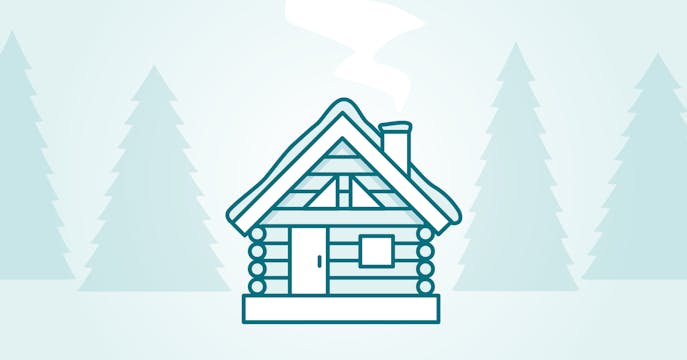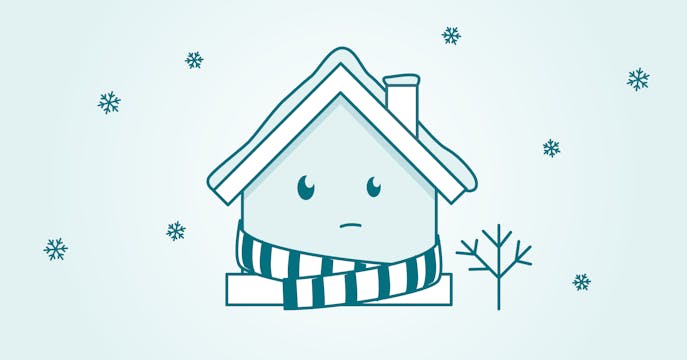Airbnb-ing to help cover mortgage payments?
Your short-term rental income may be in jeopardy.
New regulations aim to restore short-term rental properties back to long-term housing. Is your spare air mattress caught in the middle?
Have we lost sight of Airbnb's original idea?
Airbnb started with a couple of guys offering a spare air mattress, space to work, and breakfast as a hotel alternative to bring in some needed cash.
It was a hipster take on the traditional B&B (Bed and Breakfast) business model — and a short-term rental 'revolution' was born.
Yet, it's grown well beyond 'a room in a home,' with Canadians taking up vacation properties, several homes or whole condo buildings to attract short-stay income.
If you haven't heard, our nation has a chronic housing shortage. This home-grown model is now attracting the ire of federal and local governments desperate to unearth more housing and deflate higher rents and home prices.
Are the days of an (air) mattress stuffed with cash over? Or can you still take advantage of short-term rental income for mortgage help?
Hoteling a home you own? Short stays are transplanting long-term tenants.
Short-term rental income has been made more accessible via the support of platforms like Airbnb and Vrbo. By purchasing a desirable property in a desirable location, real estate investors have found they can make a lot more money turning it into a 'hotel' than finding a long-term tenant.
A long-term tenant may bring money in, but it's typically not as lucrative, flexible, or easy compared to guests who stay for a night or a week (for the most part, assuming they haven't had unruly guests).
Short-stay hosts often charge a lot more during high-seasonal demand, using the income to eventually pay off the mortgages (or gain more equity), sometimes turning around and buying even more properties geared to short-term rentals. Until 2024, most hosts could get tax credits to cover some expenses of running this business model.
Experts are saying this phenomenon has added to Canada's dilemma of the housing haves vs the have-nots:
- In 2023, 235,800 unique short-term rental listings were active on Airbnb and Vrbo, amounting to 1.4% of Canada's housing inventory
- Every 1% increase in the share of Airbnbs (across 19 Canadian cities) resulted in a 2.3% increase in rents
- A balanced rental market rate is usually around 3%; in 2022, it was 1.9%, and in 2023, it fell to 1.5%
- In 2020, Canada ranked last in housing availability, with 424 housing units per 1,000 residents, compared to the G7 average of 471
- In 2023, Canada brought in record immigration to the tune of 1.2M, and in 2024, over 400K newcomers have arrived
So now, the air mattress has flipped.
With a shortage of homes to buy and rent, homes being turned into tourist hotels are being increasingly targeted with restrictions, increased expenses, and extra taxes — putting a big dent in short-term income plans.
The Housing Debate on Short-Term Rentals
The Pros
- A Vital Source of Additional Income. To help cover mortgage payments and other home-related expenses.
- Aiding Home Affordability. With higher home prices and interest rates, this added income could help break the rent cycle to own a home.
- Putting Your Asset to Work. A home is a huge financial commitment — using it to generate occasional short-term income can help it pay for itself.
- Using unused space. If a room's just sitting there, why not invite someone who wants to pay and enjoy the local amenities?
- Flexibility. A little or a lot, short stays may fit better into a homeowner's schedule vs. a long-term tenant who is there for the length of a lease (or longer).
- Local Tourism Growth. A boost to the local economy may add town funds for services, help offset property taxes, and keep jobs flowing (all good news for maintaining location desirability, aka equity in your home).
The Cons
- Less Housing for Locals. Units or rooms used for short-term rental aren't available for primary living or long-term tenancy for those living and working there.
- Rent and Home Price Pressure. Precious housing supply being scooped up for short-term tourism can increase demand, raising rents and home prices.
- Eroding Housing Affordability to make it harder for first-time home buyers or lower-income families.
- Attracting More Regulation. Big-time investor activity in this business model is resulting in a harder clampdown — bringing complex regulations and tax compliance.
- More Costly Operating Expenses are coming down the pike, such as higher licensing fees, fines, and taxes, which may make long-term tenancy more attractive.
- Mortgage Trouble? With increased regulation, lenders may be more wary of investment and secondary properties used for short-term rental income to impact approvals and renewals.
Airbnb investors (and the like) are being ousted.
The backlash against the short-term rental market grew stronger throughout 2023. Towards the end of the year, many provincial and local governments and town councils levelled taxes and restrictions in an effort to curtail short-term rentals in favour of long-term housing.
Leading to some significant short-term rental curbs.
Income tax deduction limits for short-term rentals.
Starting January 1, 2024, the federal government will begin denying expenses related to short-term rental income, including interest expenses, in areas where such rentals are restricted (those affected will have up to a year to comply with local regulations).
A ban on unoccupied short-term rentals in BC.
Effective May 2024, in areas with more than 10K residents, a principal residence requirement means that homeowners can only rent out a room or secondary suite in a home they dwell in. Resort municipalities, like Whistler, Tofino and Osoyoos, will be exempt.
Fines for breaking the rules are tripled to $3K per day of infraction, with the authority to regulate and license short-term rentals now transferred locally.
GST/HST applied to the sale of properties used long-term for short-term rentals.
A recent Tax Court of Canada ruling saw an Ontario homeowner — who regularly rented out their property on platforms like Airbnb — have to cough up a 13% HST upon sale of the property. The reasoning is that the homeowner used the property for commercial purposes only.
This ruling is based on federal tax legislation and could apply across Canada, not just in Ontario. The specific tax rate and implications could vary depending on the province, as not all provinces have a sales tax (e.g. Alberta), and GST would be the likely fallback.
Hefty fines in Quebec.
On September 1, 2023, Quebec brought in short-term rental laws for uncertified listings — with fines of $100K for platforms if unauthorized rentals are offered and $50K for rental operators who present misleading or false information. Inspectors now comb through the sector, levying fines and ensuring compliance.
Some towns are harshly restricting short-term rentals.
In Ontario, the town of Tiny only allows guests for a minimum 6-day stay, ending 'weekend-only' rentals that can help cottage owners stay afloat with mortgage payments. Many other towns are following suit to weed this business model out on behalf of residents (though facing backlash from others who rely on the short-term income).
Federally, $50M over 3 years will aid the clamp down.
The federal government intends to support municipalities in enforcing regulations to end the gluttony of short-term rental 'abuse' to free up more long-term housing.
Not just Canada.
And it's not just Canada taking measures — other popular destinations (like Italy and Australia) are adding regulations for an industry that has grown substantially in the past few years.
Is it all too much, too soon?
Will the regulations affect homeowners and local tourism in an overly negative way? Many agree that something must be done to address the platform's popularity. But time will tell if some measures have too much bounce.
Counting pennies? 'Air mattress' hospitality may still offer mortgage help.
Short-stay platforms have been a supplemental income saviour for some struggling to afford Canada's high home prices (which require a larger share of income compared to other G7 counties).
Let's look at this article quote (BNN Bloomberg) from June 2016:
As housing prices continue to climb in cities like Vancouver and Toronto, a growing number of Canadians are using Airbnb to offset their mortgage costs, according to Aaron Zifkin, Airbnb’s Country Manager for Canada.
How much have home prices grown in Canada since 2016? About 38% — for a 2023 national average home price of $678,282.
It stands to reason that homeowners are counting on this type of extra income even more today.
While the majority of regulations and tax deterrents are aimed at big-time investors, small-time, in-home operators (the original intent of Airbnb) are now facing increased fees and taxes — with fewer expenses covered.
Short-term rental income may bring in less but can still provide budget relief. All in all, it's essential to keep an eye on the regulations and costs in your area, with thought given to whether a long-term tenant may be better worth it in the long view.
Restrictions may eventually improve or be improved for in-home operators. Some experts have declared this controversy a drop in the bucket for meaningful housing supply relief, with over 3.5M more homes needed by 2030.
Need more ways to pad your mortgage budget?
If you need help reducing your mortgage payments, a quick chat with one of our expert mortgage brokers may unfurl savings you didn't know were available.
Your best rate, suitable product and great advice can make or break a tight budget. Plus, with potentially lower interest rates on the horizon, it helps to know the options that could help you save thousands more each year.
Give us a shout. We're anywhere you are in Canada — online, over the phone or email, or drop by a store for a friendly mortgage chat.
Need mortgage options? Get the rates and product access you need.
To airbnb, or not to airbnb? That is the question.

Want to buy your Airbnb?
Love the idea of buying your own investment getaway? Here's what you need to know.
Learn More
Thinking of a winter getaway home?
The winter recreational market is cooling — is it time to find a deal?
Learn More
Vacation and Second Homes
Eyeing that second property? Gain ground with our simpler mortgage process and better rates.
Learn More
